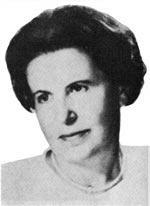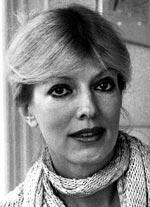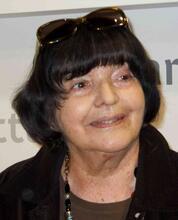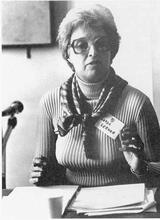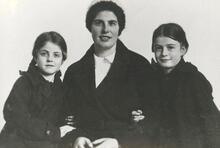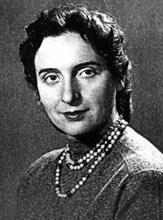Michèle Sarde
Michèle Benrey, who later adopted the pen name of Sarde, was born in France in 1939. After receiving advanced degrees in French literature in France, Sarde moved to the United States in 1968 and spent most of her teaching career (1970–2001) at Georgetown University. Sarde’s publications are in three genres: biographies, novels, and essays; she has also published numerous articles in academic journals. Her 1978 biography of the French writer Colette received an award from the Académie Française, and her other books and essays reflect her interest in female literary figures and issues of women’s equality. Sarde’s writing has also explored the trauma of war persecutions through the lens of both the Holocaust and totalitarian regimes.
Family and Education
Michèle Benrey, who was born in Brittany in 1939, adopted the pen name of Sarde. Her mother, Jenny Amon (1916–2005), was born in Salonika and moved with her parents in 1921 to France. She studied law. Her father, Jacques Benrey (1907–1979) was born in Bulgaria and migrated to France in 1922. He studied at the École Superiéure de Commerce in Paris. Her paternal grandparents, Moïse Benrey and Marie Jerusalmi, were deported during the war. At that time, Michèle and her parents moved to Angoulême in the Unoccupied Zone using false identification papers. In 1943 they moved to Marseilles, then in 1944 to Nice and to Villard-de-Lans, where her father joined the French Resistance.
After receiving advanced degrees in French literature in France (Agrégée de l’Université), Sarde went to the United States in 1968 where she spent most of her teaching career (1970–2001) at Georgetown University in Washington, D.C.
Analysis of Sarde’s Works
Michèle Sarde’s publications are in three genres: biographies, novels, and essays. In addition, she has published numerous articles in academic journals [see, in particular, “Représentations des Juifs chez Marguerite Yourcenar” (Representation of Jews in the Works of Marguerite Yourcenar), Littérature, special issue; Centre de Recherches sur les Littératures Modernes et Contemporaines, Clermont-Ferrand, France: 1995, 71–84] and co-directed the edition of Marguerite Yourcenar’s letters. Her biography of Colette, which received an award from the Académie Française, explores the tension between the French writer’s submission to traditional social forces and values and the resistance that shaped both her life and her fiction. Sarde’s interest in female literary figures was reaffirmed with Vous, Marguerite Yourcenar (You, Marguerite Yourcenar). In this non-traditional biography of the French author, Sarde engages in a “dialogue” with her subject in her formative years. Later, she turned to a different project: based upon a series of conversations, Jacques le Français tells the exemplary life of Jacques Rossi, who was sent to the Gulag in 1937 and spent nineteen years in the Soviet camps. With this book, Sarde pursued an objective close to her heart: to bear testimony to the destruction by totalitarian regimes of millions of innocent victims in the twentieth century.
In 1991 Sarde had already explored a related topic, the trauma of war persecutions and forced identities, in her novel Histoire d’Eurydice pendant la remontée (The Story of Eurydice while Ascending) (listed for the Prix Goncourt), in which the main character Sarah, adopted by Catholic parents, is renamed Sophie. Deriving largely from memories of the Holocaust and its aftermath, it tells the story of two former lovers meeting again after twenty years. In the course of a three-day “escapade” to Rome they revisit their past. Skillfully constructed and moving in concentric circles that gradually close in on the truth that the characters had hidden from each other at the time of their failed engagement, the story is rich in layers of meanings and echoes. Love had united two young people whose personal histories should have kept them apart. Eric Tosca embodied everything that Sophie Lambert should have stood against: the son of a famous tenor summarily executed for his collaboration during the war, he was also the son of French settlers in Algeria whose attachment to that land led to his participation in an extreme right-wing group resisting the end of colonization. Sophie, reborn as Sarah, struggling secretly with the recent discovery of her Jewishness and of the “disaster” that eradicated every member of her family except one, supported left-wing militants for a free Algeria. Just as the two lovers belong to two antinomic cultures, the novel draws from two major intellectual traditions and historical legacies, namely the Greek tradition, whose central myth of Orpheus and Eurydice, reinterpreted in a feminist light, confers a larger significance on the story of the two protagonists, and the Jewish-Christian tradition, which inspires two of the most moving sections of the book: the evocation of a student's pilgrimage to Chartres in the 1950s, and that of the destruction of the family of Sophie, henceforth Sarah Solal. But Sarah, while no longer a Christian in spirit, is not yet a Jew: she has become a Marrano, an exiled Jew under cover running away from Paris to try to discover who she is. While tension and separation are the major figures that structure the narrative, Eric Tosca’s interest in alchemy and esoteric knowledge, including the The esoteric and mystical teachings of JudaismKabbalah, might be interpreted as an attempt, failed though it is, to bridge the distance to the Other. (An excerpt of this book, translated into English and analyzed, is included in Eva Martin Sartori and Madeleine Cottenet-Hage, Eds., Daughters of Sarah.)
In a more peripheral fashion, Sarde evokes the Holocaust again in her later novel, Constance et la cinquantaine (Constance Reaching Fifty), in which she introduces two characters whose families were victims of the Armenian genocide. Yet another protagonist, from Chile, who sets out to discover what happened to his deceased brother under Pinochet, allows her to weave the memories of other human tragedies into her narrative. The main theme, however, is aging as experienced by a group of women friends who lived through 1968 and the 1970s in France.
Thus this novel returns to Sarde’s reflection upon the condition of women in France, the topic of a very well-reviewed book in 1993, Regard sur les Françaises (A Look at French Women), which received awards from the Académie Française and the Académie des Sciences Morales et Politiques. Blending historical overviews and vignettes of well-known feminine figures, the author theorizes that from the Middle Ages on French women have been allowed both to live in a “golden cage” and to mix with men more freely than was the case in other European societies. This, she argues, helps explain some of the French social and institutional specificities. Her dual position as both an insider and an outsider in France is reflected in this book, whose gaze is at the same time sympathetic and objective. De l’Alcôve à l’Arène, which expands on the analysis in Regard sur les Françaises, was published in 2007. Using a comparative and multidisciplinary approach (combining literature, sociology, political science, and interviews with women who made significant contributions to the French society in the preceding two decades), it traces the path followed by French women in their search for equality during that period.
In all of Michèle Sarde’s works, irrespective of their genres, the reader will find the same curiosity for and comprehension of individual and societal differences, that make her a wonderful interpreter of history and social commentator, as exemplified in Le salon de conversation (The Conversation Salon).
More recently, Sarde has been increasingly interested in returning to her Sephardic roots and is bringing them to life in novelistic form.
SELECTED WORKS BY MICHÈLE SARDE
Le Désir fou (Mad Desire). Paris: Stock, 1975 (novel).
Colette: Libre et entravée. Paris: Stock, 1978 (biography).
Colette: Free and Unfettered. Trans. Richard Miller. New York: William Morrow, 1980.
Regard sur les Françaises: Xe siècle-XXe siècle (A Look at French Women). Paris: Stock, 1983 (essay).
Vous, Marguerite Yourcenar: La passion et ses masques (You, Marguerite Yourcenar: Passion and Its Masks). Paris: Robert Laffont, 1995 (biography).
Histoire d’Eurydice pendant la remontée (The Story of Eurydice While Ascending). Paris: Le Seuil, 1991 (novel).
Le Salon de conversation (The Conversation Salon). With Catherine Hermary-Vieille. Paris: J-C Lattès, 1997 (A comparative fictional essay on cultural practices in the United States and France).
Le Livre de l’amitié: Parce que c’était lui… (The Book of Friendship: Because It Was He …). With Arnaud Blin. Paris: Seghers, 1997 (An anthology of texts on friendship).
Jacques le Français: Pour mémoire du Goulag (Jacques the Frenchman: On Memory of the Gulag). With Jacques Rossi. Paris: cherche-midi, 2002 (The story of a French political prisoner in the Soviet camps).
Constance et la cinquantaine (Constance Reaches Fifty). Paris: Le Seuil, 2003 (novel).
De l’Alcôve à l’Arène: Nouveau regard sur les Françaises. Paris: Robert Laffont, 2007.
Revenir du silence. Paris: Julliard, 2016; forthcoming in English as Returning from Silence (Swan Isle Press).
A la recherche de Marie J. Paris: Julliard, 2019.
"Writing my life." Nashim 39 (Fall 2021).
Vous doña Gracia : l’aïeule de la tribu perdue. Paris: Mialet Barrault, 2023.
Miguet-Ollagnier, Marie. “Histoire d'Eurydice pendant la remontée de Michèle Sarde: un contre Orphée?” Uranie 2 (1992): 145–161;
Proulx, Patrice J. “Of Myth and Memory: Rereading Michèle Sarde’s Histoire d’Eurydice pendant la remontée.” Religiologiques: Sciences Humaines et Religion 15 ( Spring 1997): 179–187;
Plate, Liedeke. “Breaking the Silence: Michèle Sarde’s Histoire d’Eurydice pendant la remontée.” Women in French Studies 3 (Fall 1995): 90–99.
Santoro, Milena. “‘The Disaster,’ from Histoire d’Eurydice pendant la remontée by Michèle Sarde,” in Eva Martin Sartori and Madeleine Cottenet-Hage, eds., Daughters of Sarah, Teaneck, NJ: Holmes & Meier Publishers, Inc. (2006), pp. 190–204.



